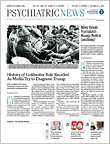Electroconvulsive therapy (ECT) is known to be an effective option for treating acute depression in elderly people who often do not respond to or who cannot tolerate standard antidepressants. The effectiveness of longer-term ECT in preventing relapse is more ambiguous; studies have shown it is about as effective as medication, but concerns over adverse cognitive effects associated with the technology have led to limited use.
The results of a two-part study of using ultrabrief ECT (where brain stimulation is delivered using shorter electrical pulses) now suggest that treating geriatric patients with ECT and pharmacotherapy may lead to more rapid and sustained improvements in depressive symptoms than pharmacotherapy alone, with few adverse effects on cognition.
The findings of the two-phase, multicenter study known as PRIDE (Prolonging Remission in Depressed Elderly) were published July 15 in AJP in Advance.
For the first part of the study, 240 seniors with depression (aged 60 and over) received three sessions of right unilateral ultrabrief ECT per week. (Compared with conventional ECT, this technique delivers shorter electrical pulses [less than 0.5 milliseconds each] to only one side of the brain.) The participants also received open-label venlafaxine daily (target dose of 225 mg/day).
There was no set timeframe for this first phase, and patients were treated until they achieved remission in their depression (requiring a Hamilton Rating Scale for Depression [HAM-D] score of less than 10 on two consecutive visits) or were classified as a nonremitter (indicating they plateaued in their improvements after a minimum of 12 ECT sessions).
Nearly 62 percent of patients achieved remission, 10 percent were classified as nonremitters, and 28 percent discontinued before they could be classified. The average number of sessions required for remission was 7.3—about 2.5 weeks, which is faster than antidepressants on average, noted lead author Charles Kellner, M.D., a professor of psychiatry at the Icahn School of Medicine at Mount Sinai in New York.
Additional analysis revealed that ECT was more effective in older patients than in younger patients (remission rates were 70 percent in patients aged 70 and older compared with 55 percent in patients aged 60 to 69). The authors noted that previous studies suggest that ECT appears to be more effective in older adults, but they said it is unclear why this might be.
The authors found no statistical differences in cognition scores between the start and end of this treatment phase (using the mini-mental state exam), though Kellner noted that a more thorough analysis of neurocognitive data will be published in a forthcoming paper. Other adverse effects were also rare and occurred in only 5 percent pf participants.
For the second phase of the PRIDE trial, 120 of the remitters were randomly assigned to continue receiving ECT sessions along with medication (venlafaxine plus lithium) or medication alone for 24 weeks.
“During this maintenance phase, we did not require a fixed schedule for the ECT sessions after the first month, but rather developed a protocol that would evaluate each patient and treat them as needed,” Kellner told Psychiatric News.
This flexible regimen, known as Symptom-Titrated, Algorithm-Based Longitudinal ECT, took into account patients’ current and previous HAM-D scores to classify them as low, moderate, or high relapse potential; based on this classification, the patients either went without ECT (low relapse potential group) or received one (moderate) or two (high) ECT sessions weekly.
After 24 weeks, the group receiving continuation ECT had an average HAM-D score of 5.5 and a 13 percent relapse rate, compared with a HAM-D score of 9.4 and 20 percent relapse rate for patients receiving medication only.
As was found during the first phase, cognition scores were the same between the ECT and medication groups. “Ultrabrief ECT is a newer form of this technology that is gaining evidence, but it is well-tolerated so doctors should not be afraid to use it in older patients,” Kellner said.
Georgios Petrides, M.D., a co-investigator on this study, agreed that the findings provide a good blueprint for keeping depression at bay. Petrides is an associate professor of psychiatry at Hofstra Northwell School of Medicine and the director of the ECT Division at the Zucker Hillside Hospital.
“The highest risk of relapse occurs in the first seven to eight weeks after the acute treatment, and the tailored approach we described in our study enables us to be vigilant and treat promptly, without giving unnecessary ECT treatments,” he said.
PRIDE was supported by multiple grants from the National Institute of Mental Health. ■
An abstract of “Right Unilateral Ultrabrief Pulse ECT in Geriatric Depression: Phase 1 of the PRIDE Study” can be accessed
here. An abstract of “A Novel Strategy for Continuation ECT in Geriatric Depression: Phase 2 of the PRIDE Study” is available
here.
